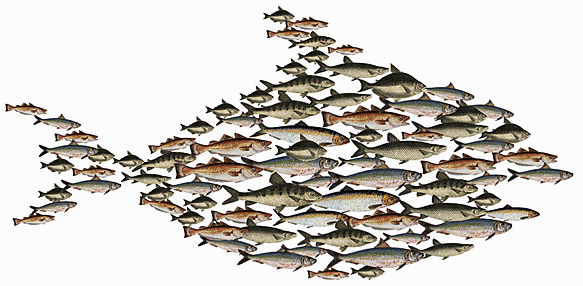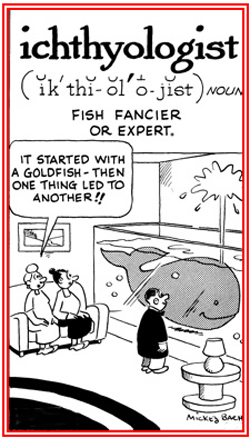ichthyo-, ichthy-, -ichth- +
(Greek: fish)

2. A vertebrate such as a lamprey or hagfish that is similar to a fish.


Go to this Word A Day Revisited Index
for a list of additional Mickey Bach illustrations.
2. The study of fish and fishlike vertebrates.
Ichthyology is the branch of zoology devoted to the study of fish
Since there are as many species of fish as all other vertebrates put together, and they have been evolving for a very long time, there is a bewildering variety; while many species have been found and described, there is much that is still not known about their biology and behavior.
The practice of ichthyology is closely connected with marine biology, limnology, and oceanography
Ichthyology is the scientific study of fishes. This includes the bony fish (Osteichthyes), the cartilaginous fish (Chondrichthyes); such as, sharks and rays, and the jawless fish (Agnatha).
An ichthyologist is a person who devotes a career to studying some of the estimated 25,000 to 30,000 species of bony fishes, sharks, rays, and lobe-finned fishes. Areas of specialty are as varied as the people who call themselves ichthyologists, and may include the study of classification, life history, anatomy, behavior, ecology or physiology, and aquarium maintenance, fish breeding, and conservation.
Ichthyologists have great concern for their subjects!
What ichthyologists have in common is a fascination, regard for, and enduring curiosity about specific and varieties of fishes, the dominant vertebrate animals in marine and fresh waters.
In addition to being the most species-rich group of vertebrates, fish are often used as experimental models for the demonstration of basic biological principles.
2. Fish-shaped; as, the ichthyomorphic idols of ancient Assyria.
Other "fish" units: pisci-, Iktho Fish Story.


